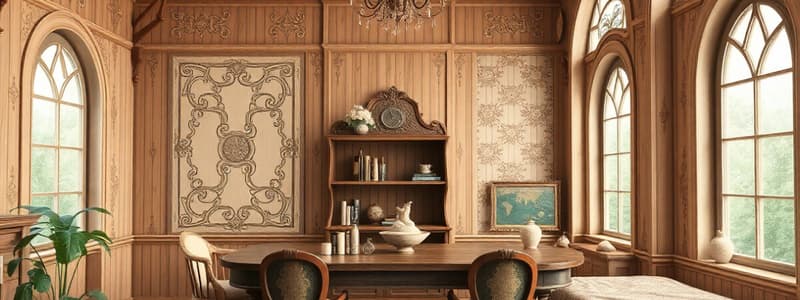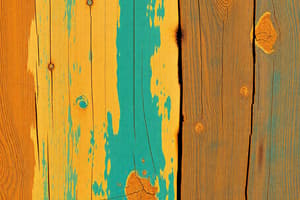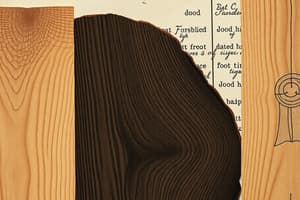Podcast
Questions and Answers
Which type of tree does hardwood primarily come from?
Which type of tree does hardwood primarily come from?
- Coniferous Trees
- Deciduous Trees (correct)
- Palm Trees
- Evergreen Trees
Softwoods are generally more expensive than hardwoods due to their slower growth rate.
Softwoods are generally more expensive than hardwoods due to their slower growth rate.
False (B)
Name a common stock form for both natural timbers and man-made boards.
Name a common stock form for both natural timbers and man-made boards.
Planks
The process of reducing moisture in wood by stacking planks and allowing air to circulate is known as ______.
The process of reducing moisture in wood by stacking planks and allowing air to circulate is known as ______.
Match the following natural timbers with their key characteristics:
Match the following natural timbers with their key characteristics:
Which of the following is a characteristic of softwood?
Which of the following is a characteristic of softwood?
Man-made boards are limited to the sizes that trees naturally grow to.
Man-made boards are limited to the sizes that trees naturally grow to.
Name one advantage of using kiln-drying over air-drying for timber.
Name one advantage of using kiln-drying over air-drying for timber.
The man-made board known as ______ is prone to chipping but has good compressive strength and is not water resistant.
The man-made board known as ______ is prone to chipping but has good compressive strength and is not water resistant.
Match each type of manufactured board with its description:
Match each type of manufactured board with its description:
Which of the following is a typical use for ash wood?
Which of the following is a typical use for ash wood?
Lamination involves shredding wood and compressing it with adhesive under extreme pressure.
Lamination involves shredding wood and compressing it with adhesive under extreme pressure.
What is the primary purpose of seasoning wood after it is cut into planks?
What is the primary purpose of seasoning wood after it is cut into planks?
Softwoods originate from ______ trees, which typically have needle-like leaves.
Softwoods originate from ______ trees, which typically have needle-like leaves.
Match each type of wood with its common applications:
Match each type of wood with its common applications:
Which characteristic makes Balsa wood suitable for modeling?
Which characteristic makes Balsa wood suitable for modeling?
MDF is highly water-resistant and suitable for outdoor use without additional treatment.
MDF is highly water-resistant and suitable for outdoor use without additional treatment.
What are the two primary processes used to create manufactured boards?
What are the two primary processes used to create manufactured boards?
The process of ______ involves layering woods and adhesive, typically with a more expensive wooden veneer on the top layer.
The process of ______ involves layering woods and adhesive, typically with a more expensive wooden veneer on the top layer.
Match the following softwoods with their key characteristics:
Match the following softwoods with their key characteristics:
For what application is Oak wood commonly used?
For what application is Oak wood commonly used?
Compression in manufactured boards involves layering wood and adhesive.
Compression in manufactured boards involves layering wood and adhesive.
What type of products is Beech wood used for?
What type of products is Beech wood used for?
[Blank] is shredded, heated, and compressed with adhesive under extreme pressure.
[Blank] is shredded, heated, and compressed with adhesive under extreme pressure.
Match the following manufactured boards with their typical uses:
Match the following manufactured boards with their typical uses:
Which of the following describes deciduous trees?
Which of the following describes deciduous trees?
Air drying is more costly than kiln-drying.
Air drying is more costly than kiln-drying.
What makes man-made boards cheaper than timbers?
What makes man-made boards cheaper than timbers?
Trees are cut then converted into ______ by cut using saws.
Trees are cut then converted into ______ by cut using saws.
Match the following natural timbers with their examples of uses:
Match the following natural timbers with their examples of uses:
Decay risk is the main disadvantage of:
Decay risk is the main disadvantage of:
Ash is the best material choice for furniture.
Ash is the best material choice for furniture.
Besides sheets and planks, what is another stock form for both natural timbers and man-made boards?
Besides sheets and planks, what is another stock form for both natural timbers and man-made boards?
[Blank] wood is light and easy to work with but can split.
[Blank] wood is light and easy to work with but can split.
Match the following manufactured boards with their examples of uses:
Match the following manufactured boards with their examples of uses:
Wood for musical instruments are commonly made of:
Wood for musical instruments are commonly made of:
Man-made boards are more likely to depend on tree growth than timber wood.
Man-made boards are more likely to depend on tree growth than timber wood.
What process involves wood being shredded, heated, and compressed with adhesive under extreme pressure?
What process involves wood being shredded, heated, and compressed with adhesive under extreme pressure?
The seasoning process helps reduce the ______ in wood.
The seasoning process helps reduce the ______ in wood.
Match the following reasons softwoods are cheaper than hardwoods
Match the following reasons softwoods are cheaper than hardwoods
Flashcards
Softwoods
Softwoods
Generally cheaper than hardwoods due to faster growth and greater availability.
Man-made boards
Man-made boards
Cheaper than timbers because they are manufactured. More variety in sizes as they aren't dependent on tree growth.
Stock Forms (Timbers)
Stock Forms (Timbers)
Sheets, dowels and planks.
Hardwoods
Hardwoods
Signup and view all the flashcards
Ash
Ash
Signup and view all the flashcards
Beech
Beech
Signup and view all the flashcards
Mahogany
Mahogany
Signup and view all the flashcards
Balsa
Balsa
Signup and view all the flashcards
Oak
Oak
Signup and view all the flashcards
Softwoods source
Softwoods source
Signup and view all the flashcards
Larch
Larch
Signup and view all the flashcards
Pine
Pine
Signup and view all the flashcards
Spruce
Spruce
Signup and view all the flashcards
Chipboard
Chipboard
Signup and view all the flashcards
MDF
MDF
Signup and view all the flashcards
Plywood
Plywood
Signup and view all the flashcards
Air-drying
Air-drying
Signup and view all the flashcards
Kiln-drying
Kiln-drying
Signup and view all the flashcards
Lamination
Lamination
Signup and view all the flashcards
Compression (Wood)
Compression (Wood)
Signup and view all the flashcards
Study Notes
- Softwoods are generally cheaper than hardwoods because they are more available and grow quicker.
- Man-made boards are cheaper than timbers because they are manufactured.
- Man-made boards come in a better variety of sizes, an advantage that they do not depend on tree growth.
- Stock forms for both hardwoods and softwoods include sheets, dowel, and planks.
Hardwoods
- Hardwoods come from Deciduous Trees.
- Deciduous trees loose leaves in the winter, and grow fruit and flowers in the spring.
- Ash is flexible, tough and shock resistant, thus useful in sports equipment and tool handles
- Beech has a fine finish and is tough and durable, so is used in toys, furniture, and veneers.
- Mahogany is easily worked, durable, with a high quality finish, ideal for high-end furniture
- Balsa is very soft and spongy and light, thus useful for modelling
- Oak is tough, durable, and hard, so is used in flooring, furniture, and veneers.
Softwoods
- Softwoods come from Coniferous Trees, which have thin, needle-like leaves and grow all year round.
- Coniferous Trees often have pine cones and sometimes nuts and seeds.
- Larch is durable, tough, with good water resistance and finishes well, this makes it useful in furniture, flooring, and outdoor applications
- Pine is light and easy to work with, but can split, making it relevant for cheap furniture, construction, and decking
- Spruce is easy to work with, has high stiffness, but can decay quickly, appropriate for furniture, musical instruments, and construction
Man-Made Boards
- Manufactured boards are made from wood chips/dust/ layers and glue.
- Chipboard is prone to chipping but offers good compressive strength and is not water resistant
- Applications for chipboard include flooring, low-end furniture, and flat-pack items
- MDF is rigid and stable, easy to finish, but absorbs liquid easily
- MDF is used in flat-pack furniture and kitchen units
- Plywood is very stable, and exterior veneer can be used from more expensive woods
- Plywood is used to make Shelving, furniture, and toys
Primary Processing
- Trees are cut then converted into planks by using saws.
- Wood is seasoned to reduce moisture content through air-drying or kiln-drying.
- Air-drying involves stacking planks and allowing air to circulate, causing evaporation.
- Kiln-drying involves placing planks in a kiln for rapid drying, but it is more costly than air-drying.
- Manufactured boards are made by lamination or compression.
- Lamination involves layering wood and adhesive, compressing them together; often uses more expensive wooden veneer on top.
- Compression involves shredding, heating, and compressing wood with adhesive under extreme pressure.
Studying That Suits You
Use AI to generate personalized quizzes and flashcards to suit your learning preferences.




